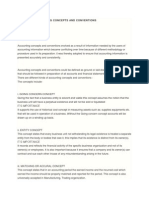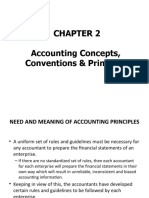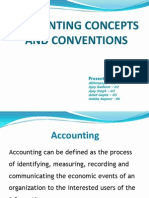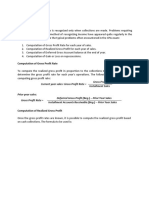0 ratings0% found this document useful (0 votes)
2 viewsconcepts-and-conventions-1-1
The document outlines the principles of accounting, categorizing them into accounting concepts and conventions. Key accounting concepts include the business entity concept, money measurement concept, and going concern concept, which provide the foundational assumptions for recording transactions and preparing financial statements. Accounting conventions, such as full disclosure and consistency conventions, are generally accepted practices that guide the application of accounting principles but allow for some flexibility based on organizational needs.
Uploaded by
uditanshu45Copyright
© © All Rights Reserved
Available Formats
Download as PPTX, PDF, TXT or read online on Scribd
0 ratings0% found this document useful (0 votes)
2 viewsconcepts-and-conventions-1-1
The document outlines the principles of accounting, categorizing them into accounting concepts and conventions. Key accounting concepts include the business entity concept, money measurement concept, and going concern concept, which provide the foundational assumptions for recording transactions and preparing financial statements. Accounting conventions, such as full disclosure and consistency conventions, are generally accepted practices that guide the application of accounting principles but allow for some flexibility based on organizational needs.
Uploaded by
uditanshu45Copyright
© © All Rights Reserved
Available Formats
Download as PPTX, PDF, TXT or read online on Scribd
You are on page 1/ 13
ACCOUNTING PRINCIPLES
“Principles of accounting are the general law or rule adopted or
proposed as guide to action, a settled ground or basis of
conduct or practice”. Accounting principles may be classified in
to two categories.
(A) Accounting concepts.
(B) Accounting conventions.
Accounting concepts- Accounting concepts are the
fundamental assumptions on which transactions are recorded
and financial statements are prepared. These concepts provide
base for accounting process. While doing accounting use of
these concepts are compulsory and they are not optional.
More or less they are rigid and can not be changed.
ACCOUNTING CONCEPTS
• FOLLWING ARE THE CONCEPT OF ACCOUNTING:
• BUSINESS ENTITY CONCEPT- According to this concept ,
business and businessman are two separate entities. In other
words business is separate and distinct from its owner.
Business transactions are recorded in the accounting books
from the business point of view and not from the owner’s
point of view. Their account with the business are credited
with the capital introduced and profit earn during the year
etc. and debited by the drawing made. This concept is
applicable to all form of business organisations.
ACCOUNTING CONCEPTS
• MONEY MEASUREMENT CONCEPT- According to this
concept ,transactions and events that can be measured in
term of money are recorded in the books of accounts. In
other words, money is the common denominator in recording
and reporting the transactions.
• GOING CONCERN CONCEPT- Going concern concept is the
fundamental accounting concept. According to this concept it
is assumed that business will continue for an indefinite period
and there is no intension to close the business. For example
huge money is invested on advertisement in expectation of
future profit.
ACCOUNTING CONCEPTS
• ACCOUNTING PERIOD CONCEPT- IT is also known as
periodicity concept, life of an orgnisation is broken in to
smaller periods e.g. 12 month so that its performance is
measured at regular intervals. According to going concern
concept business will run for indefinite period of time, the
measurement of income and studying the financial position of
the business after a very long period of time would not be
very helpful in taking corrective steps at the appropriate time.
Therefore it is necessary that after each segment of time
interval, the management should review the performance.
The segment of time period is called accounting period which
is usually a year.
ACCOUNTING CONCEPT
• HISTORICAL COST CONCEPT- According to historical cost
concept, an asset is recorded in the books of account at the
price paid to acquire it and the cost is the basis for all
subsequent accounting of the assets. Assets is recorded at the
cost at the time of its purchase but it systematically reduces ii
value by charging depreciation. The market value of an asset
may change with the passage of time , but for accounting
purpose it continues to be shown in the books of account at
its cost.
ACCOUNTIG CONCEPTS
• DUAL ASPECT CONCEPT- According to dual aspect concept , every
transaction has two aspects, a debit and a credit of equal amount. In
other words every transaction has a two-fold effect. Every debit there is a
credit of equal amount and vice versa. Because of this principles balance-
sheet has two sides i.e. assets side and liability and they will always be
equal at the end under any circumstances. So according to this concept.
• Total Assets = Total Liabilities
• or
• Total Assets = Internal Liability + External Liability
• Total Assets = Capital + Liabilities(external)
• Assets = Capital + Liabilities
• Capital = Assets - liabilities
ACCOUNTING CONCEPTS
• REVENUE RECOGNITION (REALISATION ) CONCEPT- According
to this concept, any income is treated as earned or realised
only when either it has been earned or its realization is
certain. Amount is realised only when the goods and services
are transfer to the customer. Only receiving of order is not
treated as income realised.
• Example- If any order is received in April , goods are produces
in May , It was deliver in June and its amount is realised in
August, then according to this concept revenue will be treated
as earned in the month of June when goods are delivered to
customer. It should be noted that recognizing revenue and
receipt of an amount are two separate aspects.
ACCOUNTING CONCEPT
• MATCHING CONCEPT- According to this concept a revenue will not be
called as income unless it is matched with the expenses incurred to earn
this revenue. It is very important to calculate correct profit/loss of a
business during a specified period. It is necessary that revenue of
particular period should be matched with that period of expenses. It
means expenses should be recognised with the associated revenue of
that particular period.
• ACCRUAL CONCEPT- It is necessary to do accounting on accrual basis
rather than on cash basis for getting appropriate profit/ loss of the
business. According to this accrual concept a transaction should be
recorded at the time when it takes place and not necessarily at the time
when the settlement takes place. In other words revenue should be
recorded at the time when sale are made or service are rendered and
not necessarily at the time when actual cash is received.
ACCOUNTING CONCEPTS
• VARIFIABLE OBJECTIVE CONCEPT- Objectivity means
reliability ,trustworthiness and verifiability , which means that
there is some evidence in ascertaining the correctness of the
information reported. This concept holds that accounting
should be free from personal bias. It means all accounting
transactions should be evidenced and supported by business
documents . These supporting documents are cash memo,
invoices , sales bills etc., and provide the basis for accounting
and audit.
ACCOUNTING CONVENTIONS
• Accounting conventions are generally accepted practices or
principles or guidelines which are based on custom ,usage or general
agreement. Like concepts they are not rigid or not established by law
. So they can be changed according to requirements but not very
frequently. While following conventions , personal judgment also
plays an important role so it not necessary that different organization
adopt the uniform conventions. Following are the main conventions.
• FULL DISCLOSURE CONVENTION- According to this convention all
material and significant information related with financial
transactions of an organization should be fully/completely disclosed.
Such information is normally disclosed by way of notes to annual
account . For example , along with the assets ,its mode of valuation
should also be disclosed
ACCOUNTING CONVENSIONS
• CONSISTENCY CONVENTIONS- This convention is useful and
appropriate for making comparison in statements of different
organization of the same industry or the same organization for
different years. According to this convention the policies and
methods adopted in one year should be consistent year after year so
that important conclusion and decisions can be made about the
performance of the organization. For example- Different methods are
available for charging depreciation on fixed assets the method
adopted by enterprise in one accounting period will be consistent in
next accounting periods. Being a convention it can not be rigidly
followed . So if it is justified to change the method for better
performance and result of a business the organization can change its
method but due note should be given by way of footnote after
preparing financial statements of an accounting period.
ACCOUNTING CONVENTIONS
• CONSERVATISM CONVENTION OR PRUDENCE- According to
this convention business should not be enthusiastic about the
future profit but should be conscious about the expected
losses and make provision for anticipated losses. Provision for
the expected losses should be made in advance whether
amount is known or unknown. Being a convention it is not
rigidly followed because too much provision for future losses
may disclose lower profit than actual and there may be under-
statement of assets and overstatement of liabilities due to
which there may be a creation of secret reserves.
ACCOUNTING CONVENTIONS
• MATERIALITY CONVENTION- According to this convention
only material items should be disclosed and all the
immaterial/insignificant item should be ignored or should be
merged with other items. This convention is contradictory of
full disclosure convention . More over an item may be
significant for one organization and may be insignificant for
another organization. Being a convention it is not rigid that
which item is material/significant and which one is
insignificant so personal judgment is used to decide the same.
You might also like
- Befa Accounting Concepts and ConventionsNo ratings yetBefa Accounting Concepts and Conventions24 pages
- CH 2 - Accounting Concepts and ConventionsNo ratings yetCH 2 - Accounting Concepts and Conventions43 pages
- Accounting Principles Costs & Conventions: Ravikant AgarwalNo ratings yetAccounting Principles Costs & Conventions: Ravikant Agarwal21 pages
- Accounting Principles: - Name: Aishwarya Parle - Roll No.: 9030 - Subject: Advance AccountingNo ratings yetAccounting Principles: - Name: Aishwarya Parle - Roll No.: 9030 - Subject: Advance Accounting12 pages
- Financial and Management Accounting Pgdbm/TermNo ratings yetFinancial and Management Accounting Pgdbm/Term23 pages
- Module-1: Accounting Concepts and ConventionsNo ratings yetModule-1: Accounting Concepts and Conventions14 pages
- Accounting Concepts, Conventions & PrinciplesNo ratings yetAccounting Concepts, Conventions & Principles34 pages
- Financial Accounting - Want to Become Financial Accountant in 30 Days?From EverandFinancial Accounting - Want to Become Financial Accountant in 30 Days?3.5/5 (2)
- Introducing New Market Offerings - Managing A Holistic Marketing OrganisationNo ratings yetIntroducing New Market Offerings - Managing A Holistic Marketing Organisation9 pages
- PPT1 - Marketing Creating Customer ValueNo ratings yetPPT1 - Marketing Creating Customer Value37 pages
- Pages Toddbrown Me Borrowed Bestseller Details Order C Fbcli100% (1)Pages Toddbrown Me Borrowed Bestseller Details Order C Fbcli48 pages
- SHEWA REAL 1 To 5 1625042569453874054-210No ratings yetSHEWA REAL 1 To 5 1625042569453874054-21070 pages
- Compensation and Benefits 1st 2024 2025No ratings yetCompensation and Benefits 1st 2024 202525 pages
- LO1: What Factors Should A Retailer Consider When Establishing Pricing Objectives and Policies?No ratings yetLO1: What Factors Should A Retailer Consider When Establishing Pricing Objectives and Policies?5 pages
- Lecture 7 Schilling Technological LeapfroggingNo ratings yetLecture 7 Schilling Technological Leapfrogging2 pages
- Draft Revised Fund Accounting Guidelines - September 30 2020No ratings yetDraft Revised Fund Accounting Guidelines - September 30 202027 pages
- Intermediate Accounting 1: a QuickStudy Digital Reference GuideFrom EverandIntermediate Accounting 1: a QuickStudy Digital Reference Guide
- Accounting Principles Costs & Conventions: Ravikant AgarwalAccounting Principles Costs & Conventions: Ravikant Agarwal
- Accounting Principles: - Name: Aishwarya Parle - Roll No.: 9030 - Subject: Advance AccountingAccounting Principles: - Name: Aishwarya Parle - Roll No.: 9030 - Subject: Advance Accounting
- Financial Accounting - Want to Become Financial Accountant in 30 Days?From EverandFinancial Accounting - Want to Become Financial Accountant in 30 Days?
- Introducing New Market Offerings - Managing A Holistic Marketing OrganisationIntroducing New Market Offerings - Managing A Holistic Marketing Organisation
- Pages Toddbrown Me Borrowed Bestseller Details Order C FbcliPages Toddbrown Me Borrowed Bestseller Details Order C Fbcli
- LO1: What Factors Should A Retailer Consider When Establishing Pricing Objectives and Policies?LO1: What Factors Should A Retailer Consider When Establishing Pricing Objectives and Policies?
- Draft Revised Fund Accounting Guidelines - September 30 2020Draft Revised Fund Accounting Guidelines - September 30 2020

























































































